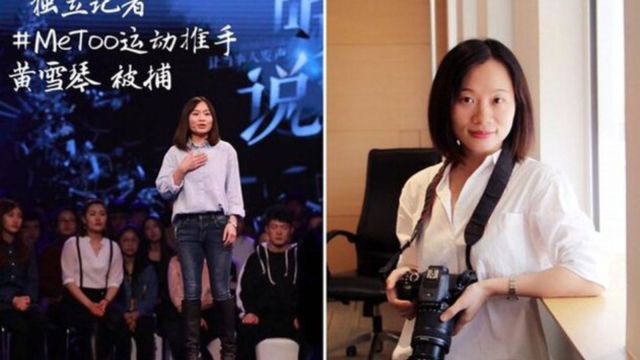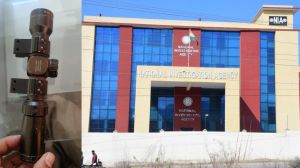Who is Sophia Huang, the Chinese journalist jailed on charges of incitement to subvert state authority?
Sophia Huang is an independent journalist who reported on sexual abuse victims and has exposed high-ranking media personalities and professors since 2016.
 Sophia Huang, 36, is an independent journalist and women's rights activist in China's #MeToo movement. (Wikimedia Commons)
Sophia Huang, 36, is an independent journalist and women's rights activist in China's #MeToo movement. (Wikimedia Commons)In a landmark case on Friday (June 14), prominent #MeToo activist and journalist Sophia Huang Xuequin was handed a five-year jail sentence by a Chinese court in Guangzhou city on charges of incitement to subvert state authority. Along with Sophia, her friend and labor activist Wang Jianbing also received a three-and-a-half-year sentence in the same trial.
Following their arrest in September 2021, the verdict was finally delivered after Sophia and Wang had already spent two years and nine months behind bars on charges of subverting state power. Sophia is slated for release in September 2026, while Wang will be freed in March next year.
Who is Sophia Huang and what has she worked for?
Sophia Huang, 36, is an independent journalist and women’s rights activist in China’s #MeToo movement. She reported on sexual abuse victims and has exposed high-ranking media personalities and professors since 2016. Her ground-breaking stories, shared on WeChat, sparked a wave of #MeToo allegations in China.
In a May 2019 interview with the University of Michigan Institute for Research on Women and Gender, Sophia, a recipient of the International Women’s Media Foundation’s Wallis Annenberg Justice for Women Journalists Award, said, “In 2018, the Chinese government started coming for me.”
By that time, her reports on sexual harassment had been deleted from WeChat. Sophia described the censorship as “severe.” She faced threats, bullying, and intimidation from authorities, culminating in her arrest in September 2021.
Sophia was en route to pursue a UK government-sponsored master’s scholarship at the University of Sussex, when authorities detained her at Guangzhou airport in 2021. Wang, aged 40, was accompanying her at the time.
Although Chinese authorities have not specified the grounds for detaining the duo on charges of subversion, their supporters argue that they were arrested for holding regular meetings and forums, where young people could openly discuss social issues.
As per a report in The Guardian, a supporter of the ‘Free Huang Xueqin and Wang Jianbing’ campaign said the closed-door trial lasted longer than anticipated. “I don’t think it should have been this severe, and it is completely unnecessary. So we support Huang Xueqin’s intention to appeal,” the spokesperson said.
Supporters said that both the activists endured months of solitary confinement during the 1,000-day pre-trial custody. Their trial only began in September 2023.
Chinese investigative journalist and #MeToo activist Sophia Huang Xueqin and workers’ rights advocate Wang Jianbing went missing in Guangzhou on Sep. 19. Huang was due to start her study in development studies in the U.K. and Wang was accompanying her before her planned flight. pic.twitter.com/OEY8RwNMsP
— Yaling Jiang (@yaling_jiang) September 21, 2021
All this persecution stems from Sophia’s courageous stance against misogyny and sexism prevalent in Chinese newsrooms. “Their efforts and dedication to labour, women’s rights, and the broader civil society won’t be negated by this unjust trial, nor will the society forget their contributions,” said the campaign supporters.
What led her to work on these issues?
In 2016, Sophia Huang noticed the lack of mainstream coverage of a story about a young woman assaulted by her internship professor at Jinan University’s School of Journalism, Sophia’s alma mater.
Disturbed by comments blaming the victim for her clothes and perceived shortcomings, Sophia questioned, “Everyone was talking about the various ‘problems’ that girl had, including her clothes — but what did her clothes say about her? These comments implied that this girl had many reasons for being sexually assaulted.”
This incident made Sophia reflect on her own experience of harassment by a professor during undergrad. She began questioning other women journalists about their experiences.
At a conference at the National University of Singapore, six out of nine female reporters shared that they, too, had faced harassment.
These revelations led Sophia into becoming a leading voice in China’s #MeToo movement. She started by posing with #MeToo signs at universities and news outlets, prompting others to share their stories. She uncovered assaults at institutions like the Peking University and the Wuhan University of Technology.
She said, “I think prevention and education is needed… because some things are still a taboo for Chinese people to talk about.
- 01
- 02
- 03
- 04
- 05































